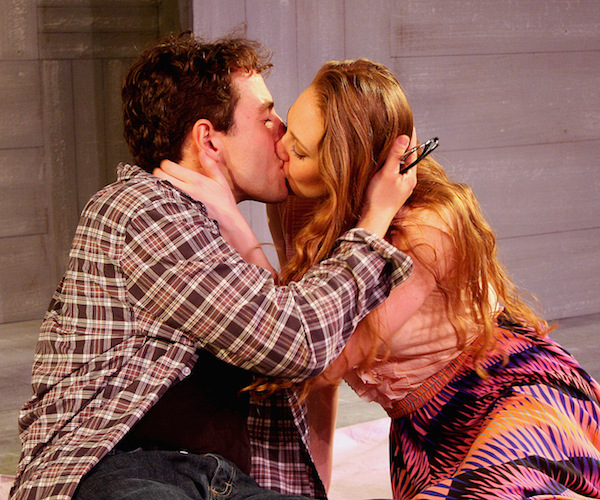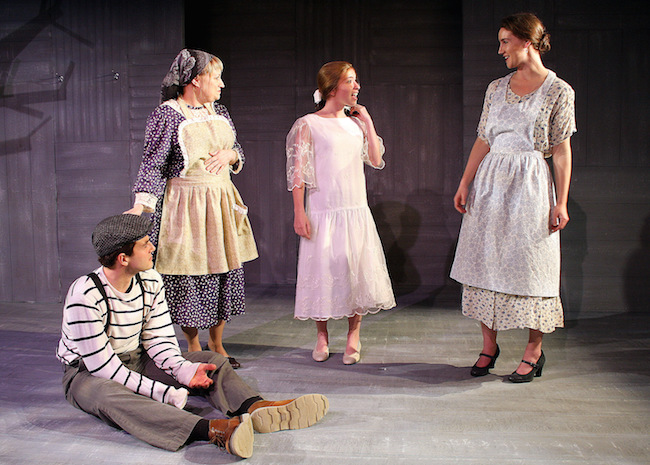Theater Review: Tennessee Williams Inspires “Desire”
The strength of the source material — and the skills of Tennessee Williams’ posthumous collaborators — provides an evening of compelling theater.
Desire: An Evening of Plays by Contemporary Playwrights Adapted from Short Stories by Tennessee Williams. Directed by David J. Miller. Presented by Zeitgeist Stage Company at the Boston Center for the Arts, Boston, MA, through May 20.

Jon Vellante and Margaret Dransfield in “The Field of Blue Children” by Rebecca Gilman in Zeitgeist Stage Company’s “Desire,” plays based on short stories of Tennessee Williams. Photo: Richard Hall/Silverline Images.
By Ian Thal
Tennessee Williams was an immensely prolific writer – not only did he author dozens of plays, many unfairly ignored in his lifetime, but novels, poems, and short stories (which sometimes provided the seeds for stage scripts). Desire is an evening’s worth of theatrical adaptations of six short stories commissioned by director Michael Wilson and The Acting Company: the assemblage premiered at NYC’s 59E59 in 2015. The results are generally remarkable – yes, there is some unevenness (as is often the case in anthologies), but the strength of the source material — and the skills of Williams’ posthumous collaborators — provides an evening of compelling theater.
The first offering, Beth Henley’s The Resemblance Between a Violin Case and a Coffin, is the collection’s most autobiographical piece , centered as it is on the relationship between a peculiar boy named Tom (Jon Vellante) and his sister Roe (Margaret McFadden), a talented young pianist. Their close relationship is disrupted when a young virtuoso violinist, named Richard Miles (Sam Terry), moves to their small town. Both brother and sister experience their first romantic crushes on the new arrival. Henley infuses the narrative with an understandably elegiac mood: much of the drama depends on the audience knowing something of Williams’ life and his sister Rose’s descent into madness. Director Miller adds an inspired theatrical touch, an enchanting bit of physical theater that involves Eric McGowan and Alexander Rankin (as stagehands) manipulating the wheels of Richard’s bicycle and Roe’s piano.
David Grimm’s Oriflamme provides a showcase for actor Lindsay Beamish, a recent transplant from Los Angeles. She plays Anna Kimball, one of those sensitive types with whom Williams empathized. Long an emotional wallflower, Anna decides to step out on a late summer day, ready to experience the excitement that she long felt to be other people’s birthright. A newly purchased bright red evening dress serves as the battle flag in her campaign for personal revolution. Walking up to the highest spot in the city park, she meets a ne’er-do-well named Rodney (Damon Singletary), called “Hooch” by his friends. Inevitably, the piece explores how male chauvinists equate any woman seeking to take control of her own sexuality as no more than an easy lay. Anna may have entered the park naïve and idealistic but – at least as played by Beamish – she isn’t settling for vulnerable.
Singletary is given his moment to shine as Fountaine Le Grand in Marcus Girdle’s Desire Quenched by Touch, which is based on the story “Desire and the Black Masseur.” This macabre police procedural set in 1952 New Orleans gives us Detective Bacon (Rankine), who is investigating the disappearance of a young white mortician, Anthony Burns (Terry), a known homosexual with a long rap-sheet for “indecency.” Burns was a regular client of Le Grand’s at the Turkish baths. While never forsaking naturalism, the script hints at Williams’ later explorations of sadomasochistic desire in such absurdist comedies as The Remarkable Rooming-House of Madame Le Monde. Burns demands that his flesh be treated with more and more punishing force, and Le Grand discovers the pleasure of mastery as he plays Burns’ body like a cello, a sequence of movement that Singletary turns into a visual leitmotif. Singletary’s performance here is one of the highlights of the evening – not just in his kinesthetic inventiveness, but his portrait of how a black, queer, working-class artist must code-switch from one persona to another in order to successfully navigate a racist, classist, and homophobic society.

Jon Vellante, Lindsay Beamish, Margaret McFadden, and Katie Flanagan in “The Resemblance Between a Violin Case and a Coffin” by Beth Henley in Zeitgeist Stage Company’s “Desire,” plays based on short stories of Tennessee Williams. Photo: Richard Hall/Silverline Images.
Rebecca Gilman’s The Field of Blue Children updates the 1939 short story to the age of social media. It opens with a scenario familiar to many contemporary writers: a poetry class offered by a creative writing department. Dylan (Vellante) has just finished reading his poem; during the feedback period his girlfriend Cee Cee (a bohemian Beamish) proffers skeptical technical analyses of individual lines, only to be silenced by the teacher (Terry), who insists the class’s responses be positive rather than critical. Consequently, Laylee (Dransfield), a classmate who confesses she knows nothing about poetry, provides a gushing revery about how Dylan’s poem evokes her grandmother. Laylee is not the ditzy sorority girl she first appears to be in the class, only there because she needs to get the literature requirement out of the way before graduation. She hopes that poetry – any kind of meaningful language – can somehow liberate her from disappearing into a puerile sub-culture in which others want to confine her. It is the place where the display of intelligence or a strong opinion is seen to make a young woman unattractive — the only acceptable utterances concern dating, shoes, clothing, jewelry, hair, and the next party. One night she attends an off-campus poetry reading with Dylan; the elevating experience only leaves her feeling even more oppressed, now that she has discovered there is a challenging world beyond her social circles that she cannot join without rejecting everything familiar to her.
Somewhat slighter, but no less entertaining, is Elizabeth Egloff’s Attack of the Giant Tent Worms, which is based on Williams’ “Tent Worms.” Married New York couple Billy (Rankine) and Clara (Dransfield) have rented the same house on Cape Cod every summer. Billy is supposed to be writing his next book, but he has become fixated on killing the tent worms (or more properly, caterpillars) whose silk tents are overwhelming the property. Clara, meanwhile, lounges in the sun sipping one tom collins after another. All of this activity is really just a distraction from the phone call they dread: Billy’s doctor has test results for them.
John Guare’s You Lied to Me About Centralia has a particularly interesting pedigree; it is based on Williams’ “Portrait of a Girl in Glass,” which provided the kernel from which the author developed one of his best-known plays, The Glass Menagerie. Jim (McGowan) and his fiancée Betty (Katie Flanagan) sit on a bench at a train station and recount their day’s adventures. To Betty’s shock, the eccentric bachelor uncle from whom she was hoping to solicit a wedding gift is queerer than she ever imagined: his long time fiancée appears to be a fiction and, to add insult to indignity, the African-American man she mistook to be her uncle’s servant is, in reality, his lover. In contrast, Jim is fascinated by the strangeness he witnessed after visiting the family of the co-worker he calls “Shakespeare.” He wonders if there isn’t a finer world to which people like Betty and himself are simply not privy. Guare displays plenty of craft in this adaptation, but he takes few dramatic risks; two fairly conventional people sitting on a bench, engaging in a low stakes conversation, is a staple of the ten-minute play festival circuit. Whereas most of the other dramatists who contributed to Desire drew inspiration from Williams and then went on their own distinctive ways (or at least paid homage to the author at his most challenging), Guare ends up taking us, one again, for a nostalgic spin on a Streetcar named Desire.
Ian Thal is a playwright, performer, and theater educator specializing in mime, commedia dell’arte, and puppetry, and has been known to act on Boston area stages from time to time, sometimes with Teatro delle Maschere. He has performed his one-man show, Arlecchino Am Ravenous, in numerous venues in Massachusetts and Rhode Island. One of his as-of-yet unproduced full-length plays was picketed by a Hamas supporter during a staged reading. He is looking for a home for his latest play, The Conversos of Venice, which is a thematic deconstruction of Shakespeare’s The Merchant of Venice. Formerly the community editor at The Jewish Advocate, he blogs irregularly at the unimaginatively entitled The Journals of Ian Thal, and writes the “Nothing But Trouble” column for The Clyde Fitch Report
